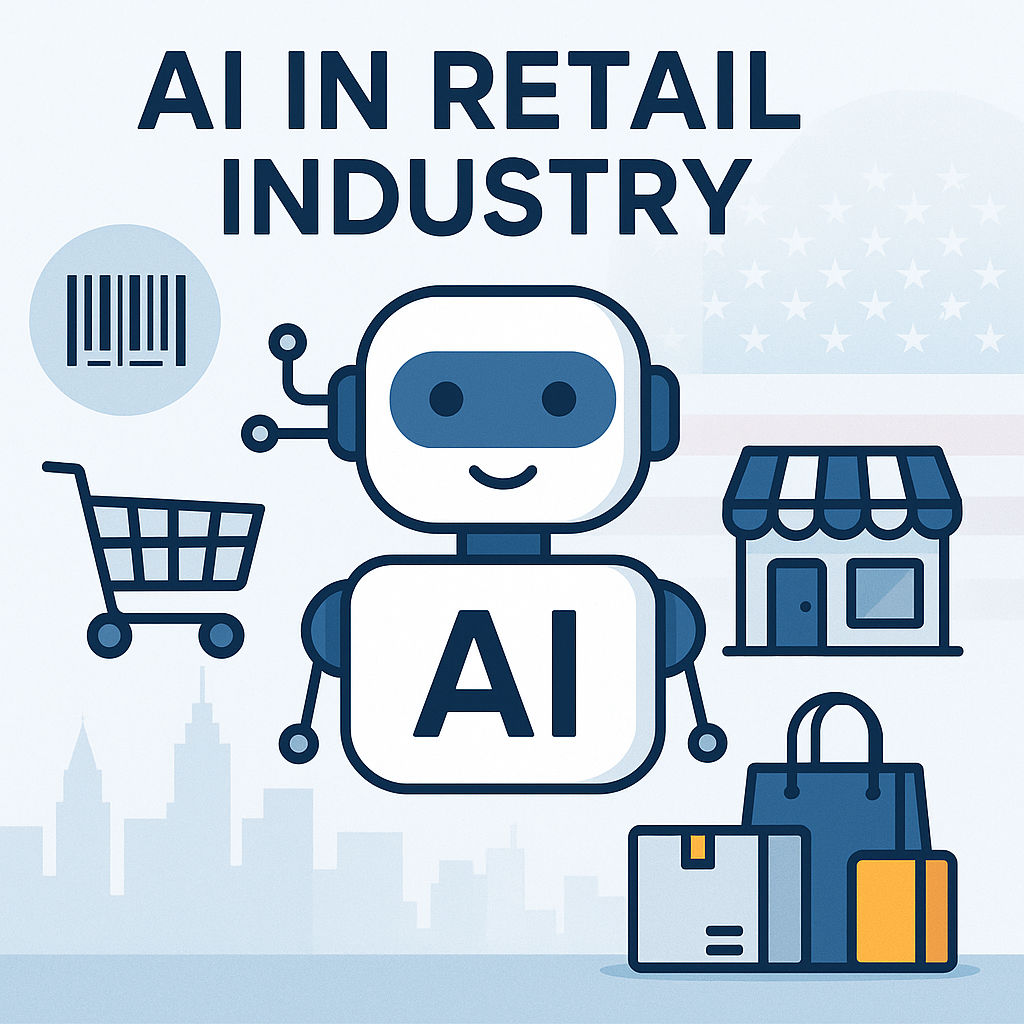
AI in Retail Industry: Transforming Shopping in 2025
Artificial Intelligence (AI) is revolutionizing the retail industry in the United States, reshaping how businesses operate and how consumers shop. In 2025, AI in retail industry is not just a buzzword—it’s a critical driver of efficiency, personalization, and profitability. This comprehensive guide explores the latest trends, benefits, use cases, and future outlook for AI in the retail sector.
How AI in Retail Industry is Reshaping U.S. Shopping Experiences
AI in retail industry is enabling retailers to deliver smarter, faster, and more personalized experiences. From inventory management to customer service, AI-powered solutions are streamlining operations and enhancing customer satisfaction.
Key Areas Where AI Impacts Retail
- 🛒 Personalized product recommendations
- 📦 Automated inventory management
- 🤖 AI-powered chatbots and virtual assistants
- 🏬 Smart checkout and cashierless stores
- 📊 Predictive analytics for demand forecasting
Top 10 AI Applications in Retail Industry (2025)
AI is being adopted across various retail functions. Here are the top 10 AI applications transforming the U.S. retail landscape in 2025:
- Personalized Product Recommendations
- AI-Powered Chatbots and Customer Service
- Inventory Optimization and Demand Forecasting
- Visual Search and Image Recognition
- Dynamic Pricing Strategies
- Fraud Detection and Loss Prevention
- Automated Checkout and Cashierless Stores
- Supply Chain Optimization
- Sentiment Analysis and Social Listening
- In-Store Robotics and Automation
Side-by-Side Comparison Table: Top 10 AI Applications in Retail
| Rank | AI Application | Key Benefit | Example Use Case |
|---|---|---|---|
| 1 | Personalized Recommendations | Boosts sales, customer loyalty | E-commerce product suggestions |
| 2 | AI Chatbots & Customer Service | 24/7 support, reduces costs | Automated FAQs, order tracking |
| 3 | Inventory Optimization | Reduces stockouts, overstock | Real-time inventory updates |
| 4 | Visual Search & Image Recognition | Enhances search, improves UX | Snap-to-shop mobile features |
| 5 | Dynamic Pricing | Maximizes revenue, competitiveness | Real-time price adjustments |
| 6 | Fraud Detection & Loss Prevention | Reduces shrinkage, increases trust | Transaction monitoring |
| 7 | Automated Checkout | Faster shopping, less labor | Cashierless convenience stores |
| 8 | Supply Chain Optimization | Improves efficiency, lowers costs | AI-driven logistics planning |
| 9 | Sentiment Analysis & Social Listening | Informs marketing, product dev | Social media monitoring |
| 10 | In-Store Robotics & Automation | Streamlines operations, reduces labor | Shelf scanning robots |
TIP: Retailers leveraging multiple AI applications see higher ROI and improved customer satisfaction compared to those using only one or two solutions.
Benefits of AI in Retail Industry for U.S. Businesses
Implementing AI in retail industry brings a host of advantages for American retailers:
- ✅ Enhanced customer experience through personalization
- ✅ Increased operational efficiency and cost savings
- ✅ Improved inventory management and reduced waste
- ✅ Real-time insights for better decision-making
- ✅ Competitive advantage in a crowded marketplace
AI-Powered Personalization: The New Standard in Retail
Personalization is at the heart of AI in retail industry. AI algorithms analyze customer data—such as browsing history, purchase patterns, and preferences—to deliver tailored recommendations and promotions.
Example: Personalized Recommendation Engine (Python Pseudocode)
import pandas as pd
from sklearn.neighbors import NearestNeighbors
# Load customer purchase data
data = pd.read_csv('purchase_history.csv')
# Fit recommendation model
model = NearestNeighbors(n_neighbors=5, algorithm='auto')
model.fit(data[['product_features']])
# Recommend products for a new customer
distances, indices = model.kneighbors([[new_customer_features]])
recommended_products = data.iloc[indices[0]]
TIP: AI-driven personalization can increase average order value by up to 20% in 2025.
AI in Retail Industry: Inventory Management and Demand Forecasting
Efficient inventory management is crucial for profitability. AI-powered demand forecasting uses machine learning to predict sales trends, optimize stock levels, and minimize losses.
Benefits of AI-Driven Inventory Management
- 📦 Reduces overstock and stockouts
- 📦 Improves supply chain efficiency
- 📦 Enables real-time inventory tracking
AI Chatbots and Virtual Assistants: 24/7 Customer Service
AI chatbots are transforming customer service in the retail industry. These virtual assistants handle inquiries, process orders, and resolve issues instantly, providing seamless support around the clock.
Example: Simple AI Chatbot (Python Pseudocode)
def chatbot_response(user_input):
if "order status" in user_input:
return "Please provide your order number."
elif "return policy" in user_input:
return "You can return items within 30 days of purchase."
else:
return "How can I assist you today?"
# Example interaction
print(chatbot_response("What is your return policy?"))
TIP: In 2025, over 70% of U.S. retail customer interactions are expected to be handled by AI chatbots.
Visual Search and Image Recognition: Enhancing the Shopping Journey
Visual search powered by AI allows shoppers to upload images and find similar products instantly. Image recognition also helps retailers with shelf management and loss prevention.
Example: Visual Search Workflow
1. Customer uploads product image via app
2. AI model analyzes image features
3. System matches features to product database
4. App displays visually similar products for purchase
The Future of AI in Retail Industry: Trends to Watch in 2025
AI in retail industry will continue to evolve rapidly. Key trends shaping the future include:
- 🏬 Expansion of cashierless stores and smart checkout
- 📊 Advanced predictive analytics for hyper-personalization
- 🤖 Increased use of robotics for in-store operations
- 🌎 Greater integration of AI with omnichannel retail strategies
- 🛒 Enhanced AR/VR shopping experiences powered by AI
Conclusion: Embracing AI in Retail Industry for Success in 2025
AI in retail industry is no longer optional—it’s essential for U.S. retailers aiming to thrive in 2025 and beyond. From personalized recommendations to automated inventory management and AI-powered customer service, artificial intelligence is driving efficiency, boosting sales, and transforming the shopping experience. Retailers who embrace AI technologies are better positioned to meet evolving consumer expectations, reduce operational costs, and stay ahead of the competition. As AI continues to advance, its role in shaping the future of retail will only grow stronger, making now the perfect time for businesses to invest in intelligent solutions and secure their place in the next era of retail.